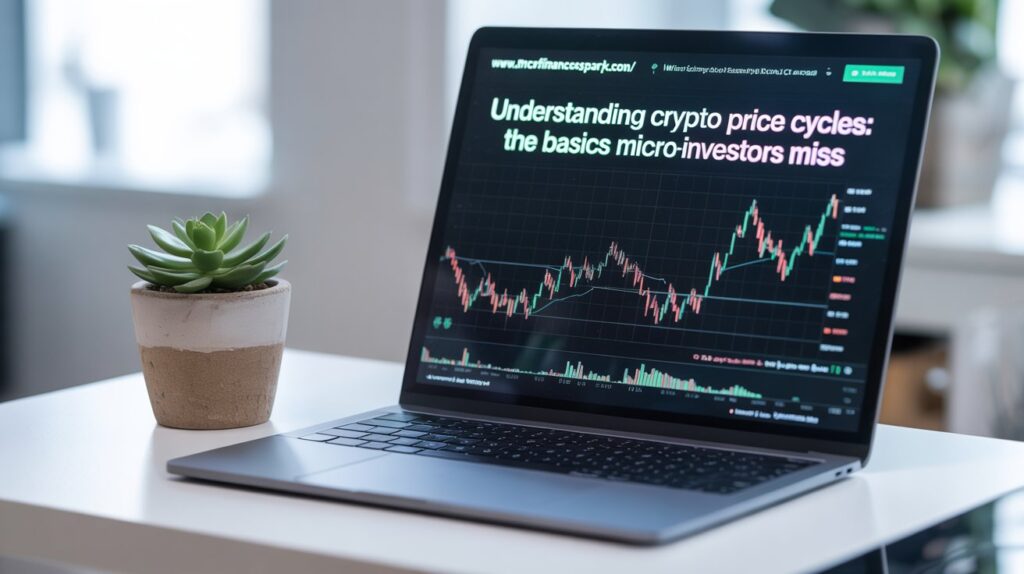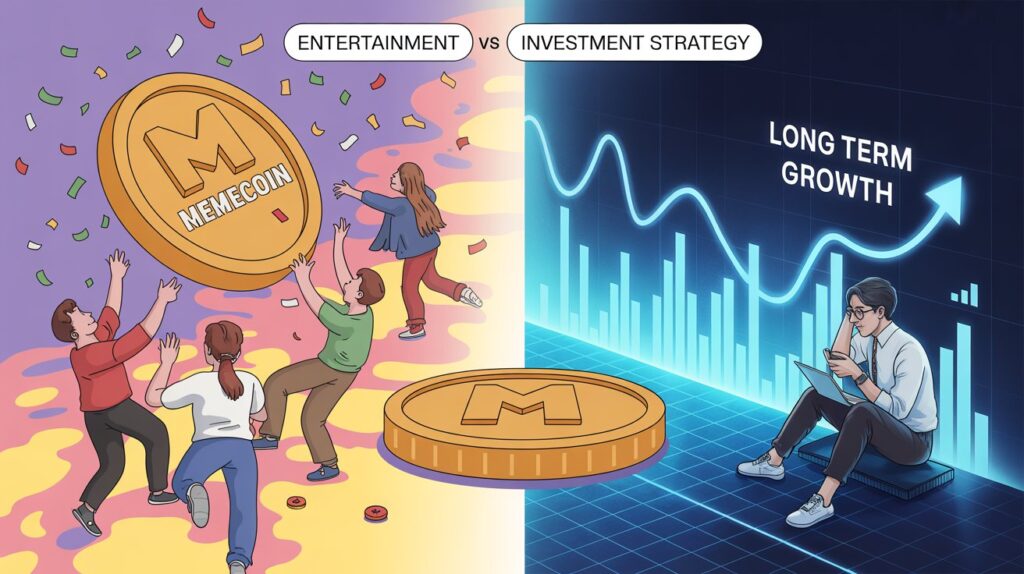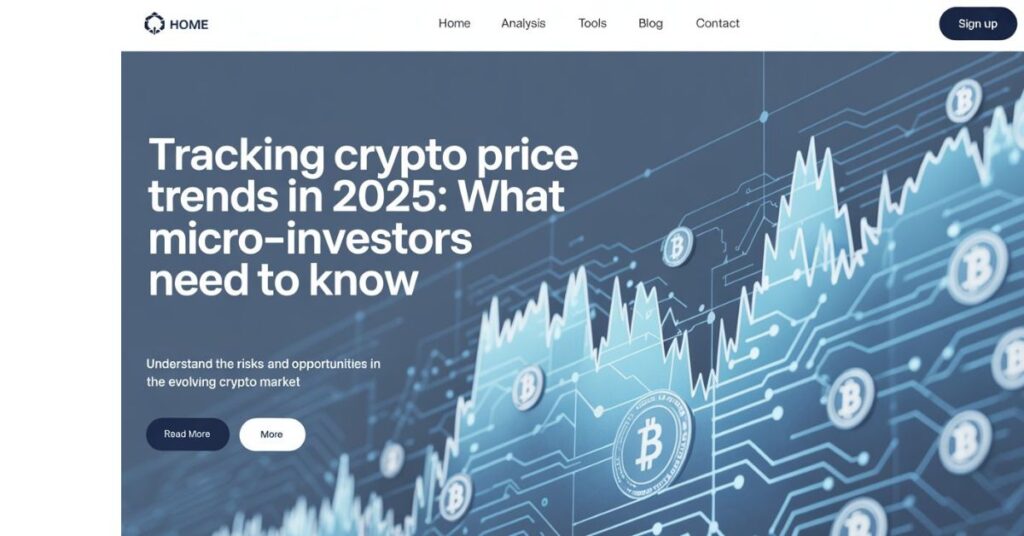The crypto price trends in 2025 landscape has evolved dramatically, presenting both unprecedented opportunities and complex challenges for small-scale investors.
As micro-investors navigate the volatile world of digital assets, understanding how to effectively track and interpret crypto market trends 2025 has become essential for success.
This comprehensive guide delivers practical strategies specifically designed for investors working with limited capital.
Understanding Crypto Price Cycles: The Basics Micro-Investors Miss

Tracking crypto price trends requires foundational knowledge that many beginners overlook. The cryptocurrency market operates on predictable patterns, yet small investors often miss critical signals that could protect their capital.
The four-year Bitcoin halving cycle forms the backbone of crypto market timing. Every 210,000 blocks (approximately four years), Bitcoin mining rewards cut in half, reducing new supply entering the market.
The Bitcoin halving 2024 impact occurred in April 2024, and historical data shows prices typically surge 12-18 months post-halving. However, 2025’s cycle shows unique characteristics due to unprecedented institutional investors participation through spot ETFs.
Bull vs bear market indicators function differently for accounts under $1,000. While large investors can weather 40-60% drawdowns, micro-investors must employ stricter risk management protocols. Key indicators include:
- Bitcoin dominance above 50% typically signals market uncertainty
- Trading volume decreases of 30%+ suggest weakening momentum
- Rising blockchain transaction fees indicate network congestion and potential price peaks
- Social media sentiment shifts often precede major price movements by 48-72 hours
Balance and moderation in investing proves crucial when capital is limited. A 20% portfolio loss requires 25% gains to break even, but a 50% loss demands 100% returns. This mathematical reality makes crypto risk management 2025 non-negotiable for small accounts.
Must read about: Are Memecoins Halal? The Truth About $TRUMP Coin, Dogecoin, and Other Memecoins
Free and Low-Cost Tools for Tracking Price Trends
Effective crypto portfolio management tools don’t require expensive subscriptions. Retail investors can access institutional-grade data through strategic tool selection.
Coin Market Cap and Coin Gecko provide comprehensive market data, but smart investors focus on specific metrics:
| Metric | What It Reveals | Why It Matters |
|---|---|---|
| Market Cap | Project size and stability | Higher cap = lower volatility risk |
| 24h Volume | Trading activity | Volume > 10% of market cap signals liquidity |
| Circulating Supply | Available tokens | Low circulation with high max supply = dilution risk |
| Fully Diluted Valuation | Future market cap at max supply | Reveals potential price ceiling |
Crypto screening tools like TradingView offer free alert systems. Set price notifications at 5% intervals above and below your entry point to monitor positions without constant checking. This automation prevents emotional decision-making while maintaining awareness.
Crypto analytics platforms provide on-chain metrics even on free tiers. Glassnode’s basic access reveals:
- Bitcoin holder distribution (whales vs retail)
- Exchange inflow/outflow patterns
- Network activity and adoption metrics
- Profit/loss positions of market participants
Crypto forecasting tools incorporating AI (Artificial Intelligence) have improved accuracy rates to 60-65% for short-term predictions, though long-term crypto strategies should never rely solely on algorithmic outputs.
Bitcoin in 2025: Post-Halving Reality Check

Bitcoin price prediction 2025 ranges from $75,000 to $150,000 based on current trajectory and historical post-halving performance. The April 2024 halving reduced block rewards from 6.25 to 3.125 BTC, constraining supply while institutional investors continue accumulating.
Spot Bitcoin ETFs launched in January 2024 have absorbed over $15 billion in net inflows, fundamentally altering market dynamics. Traditional wealth management in crypto now includes Bitcoin as a store of value digital assets allocation, legitimizing the asset class for conservative portfolios.
However, micro-investors face unique challenges. At $90,000 per Bitcoin, a $500 investment buys just 0.0055 BTC. Transaction fees on the base layer can consume 2-5% of small purchases, making frequent trading economically inefficient. Layer-2 crypto scaling solutions like Lightning Network offer fee reduction but require technical knowledge many beginners lack.
Bitcoin dominance currently sits at 54%, indicating capital concentration in the largest digital asset. When dominance rises above 60%, altcoin bleeding typically intensifies. Crypto investing for beginners during high Bitcoin dominance periods should focus on the primary asset until capital rotates to alternatives.
The blockchain transparency of Bitcoin provides verifiable supply data—21 million maximum coins with 19.7 million already mined. This scarcity narrative drives store of value comparisons to gold, with some analysts predicting Bitcoin could capture 10% of gold’s $13 trillion market cap by 2030.
Ethereum and Layer-2 Solutions: Where Micro-Investors Can Still Win
Ethereum growth 2025 accelerates through blockchain scalability improvements and Layer-2 crypto scaling solutions maturation. The Ethereum network processes 15-30 transactions per second on Layer-1, but Arbitrum and Optimism networks handle thousands while maintaining security guarantees.
Layer-2 solutions critically benefit micro-investors through fee reduction:
| Network | Average Transaction Fee | Settlement Time | Best For |
|---|---|---|---|
| Ethereum (Layer-1) | $2-$15 | 12 seconds | Large transactions > $1,000 |
| Arbitrum | $0.10-$0.50 | 2-5 minutes | DeFi interactions |
| Optimism | $0.15-$0.60 | 2-5 minutes | NFT trading |
| Base | $0.05-$0.30 | 2 seconds | Frequent small trades |
Staking vs profit-sharing models on Ethereum offer accessible yield. With 32 ETH required for solo validation ($96,000+ at current prices), micro-investors can participate through liquid staking protocols like Lido or RocketPool with minimums as low as 0.01 ETH ($30).
Current staking yields average 3.2-4.5% annually, modest but predictable compared to DeFi yield farming risks. Smart contracts and blockchain technology automate distributions, eliminating intermediary trust requirements.
Ethereum ETF approvals in May 2024 brought institutional validation similar to Bitcoin, though with slower adoption rates. The merge to proof-of-stake reduced Ethereum energy consumption by 99.95%, addressing environmental concerns that previously limited sustainable investing participation.
Crypto portfolio management tools should weight Ethereum at 20-30% for balanced portfolios due to its smart contract dominance and developer ecosystem. Over 4,000 decentralized applications run on Ethereum, generating real economic activity beyond speculation.
AI-Crypto Integration: Separating Hype from Real Opportunities

AI in crypto trading and artificial intelligence in finance represent converging technological frontiers. However, distinguishing between genuine innovation and marketing requires critical analysis.
AI-driven decision making platforms like Numerai and Fetch.ai build decentralized computing networks where algorithms compete for accuracy. These projects demonstrate real fintech development rather than simply adding “AI” to whitepapers for hype.
Automated crypto analysis tools use machine learning for pattern recognition:
- Crypto volatility analysis models predict price swings with 62% accuracy
- Sentiment analysis algorithms scan social media for trend detection
- Algorithmic trading bots execute strategies based on technical indicators
- Portfolio rebalancing automation maintains target allocations
Yet AI (Artificial Intelligence) limitations remain significant. Models trained on historical data fail during unprecedented events like regulatory announcements or black swan events. The 2022 Terra/LUNA collapse devastated AI trading bots programmed on stablecoin stability assumptions.
Crypto trading automation suits specific strategies but shouldn’t replace human judgment for micro-investors. Automated systems require capital reserves to survive drawdown periods—resources limited portfolios lack.
Projects building genuine AI infrastructure include:
- Render Network (RNDR): Decentralized GPU rendering for AI model training
- SingularityNET (AGIX): AI marketplace and development platform
- Ocean Protocol (OCEAN): Data exchange for AI algorithms
- Bittensor (TAO): Decentralized machine learning network
These represent asset-backed crypto tokens with tangible utility rather than speculative vehicles. Ethical technology use considerations include data privacy, algorithm bias, and centralization risks within supposedly decentralized systems.
DeFi in 2025: What’s Actually Safe for Small Investors
Decentralized finance (DeFi) promised financial democratization but delivered complexity and risk alongside opportunity. DeFi yield farming risks particularly threaten micro-investors unprepared for protocol vulnerabilities.
The 2024-2025 period saw DeFi total value locked stabilize around $85 billion after peaking at $180 billion in 2021. Maturation brought improved security audits and reduced—but not eliminated—smart contract exploits.
Smart contracts and blockchain technology automate financial services without intermediaries, but code vulnerabilities enable theft. Over $2.3 billion was lost to DeFi hacks in 2024, though this represents significant improvement from previous years’ $3.8 billion.
For accounts under $1,000, DeFi participation should follow strict protocols:
Safe DeFi Strategies:
- Limit exposure to 10-20% of total crypto portfolio
- Use only audited protocols with 2+ years operational history
- Avoid complex yield farming strategies requiring multiple protocol interactions
- Stick to established platforms like Aave, Compound, Uniswap
- Never invest more than you can afford to lose completely
Gas fee strategies preserve small capital. Ethereum Layer-1 transactions costing $5-15 consume significant percentages of small positions. Executing DeFi interactions on Layer-2 solutions like Arbitrum reduces fees by 90-95%, making micro-position management economically viable.
Staking vs profit-sharing comparisons reveal important distinctions. Staking typically offers 3-8% annual yields with moderate risk, while yield farming promises 20-200%+ returns accompanied by proportional danger. Guaranteed return concerns apply whenever yields exceed sustainable economic activity—if returns seem too good, they probably are.
Decentralized trading platforms like Uniswap now process billions in daily volume with increased efficiency. The V3 protocol introduced concentrated liquidity, allowing micro-investors to provide liquidity with smaller capital while earning competitive fees.
Must read about: Halal Crypto Insights — Understanding Digital Currencies in Islam and Beyond
Real World Asset Tokenization: The Emerging Opportunity
Real world assets (RWA) tokenization represents crypto’s most practical 2025 innovation. Tokenization of real assets brings traditional finance onto blockchain rails, enabling fractional ownership of previously inaccessible investments.
Tokenized real estate platforms allow investments starting at $50-100 rather than $50,000+ typical property minimums. Projects like RealT and Lofty tokenize rental properties, distributing income proportional to token holdings. This democratizes asset-backed investing for retail investors globally.
Asset-backed crypto tokens provide collateral stability absent in pure digital assets:
| Asset Class | Example Projects | Minimum Investment | Typical Returns |
|---|---|---|---|
| Real Estate | RealT, Lofty | $50-500 | 8-12% rental yield |
| Treasury Bonds | Ondo Finance, Franklin Templeton | $100 | 4-5% (matching traditional rates) |
| Commodities | Paxos Gold (PAXG), Tether Gold | $100 | Tracks gold price |
| Private Credit | Centrifuge, Maple Finance | $1,000 | 9-15% |
Tokenized ownership solves liquidity problems in traditionally illiquid assets. Unlike physical real estate requiring months to sell, tokenized real estate trades 24/7 on decentralized trading platforms. This flexibility particularly benefits micro-investors needing quick access to capital.
Regulatory clarity improved significantly in 2024-2025. The regulatory framework now recognizes security tokens under existing securities law, providing investor protections while enabling innovation. Crypto regulation 2025 continues evolving toward comprehensive frameworks in major markets.
Financial inclusion drives RWA adoption in emerging markets. Blockchain technology enables property ownership verification in countries with unreliable land registries, protecting small investors from fraud while facilitating economic participation.
However, guaranteed return concerns apply even to asset-backed crypto tokens. Rental yields depend on tenant occupancy, commodity prices fluctuate, and private credit carries default risk. RWA tokenization doesn’t eliminate underlying asset risks—it merely democratizes access.
Meme Coins: Entertainment vs Investment Strategy

Meme coins and speculation dominate crypto headlines but destroy more wealth than they create for micro-investors. Dogecoin and Shiba Inu trends demonstrate both astronomical gains and catastrophic losses within single market cycles.
Dogecoin trades at $0.08 in early 2025, down 89% from its $0.73 May 2021 peak despite positive social sentiment. Shiba Inu similarly deflated 92% from all-time highs. These patterns repeat across thousands of meme tokens—explosive pumps followed by grinding declines.
The psychology behind meme coin volatility exploits speculation impulses:
- FOMO (fear of missing out) drives irrational entry timing
- Social media echo chambers create false consensus
- Low prices ($0.0001) create illusion of affordability
- Celebrity endorsements override fundamental analysis
- Gambling mentality replaces investment strategy
If micro-investors insist on meme coin exposure despite these risks, strict rules apply:
Meme Coin Risk Management:
- Never allocate more than 5% of crypto portfolio
- Set hard stop-losses at 25-30% below entry
- Take profits at 2-3x rather than holding for moonshots
- Assume total loss when calculating position size
- Never use borrowed money or emergency funds
Crypto market trends 2025 show meme coin market cap declining from $60 billion peaks to $15 billion as retail investors shift toward utility-focused projects. The maturation cycle typical of emerging asset classes is playing out—speculation gradually yields to fundamental value assessment.
Balance and moderation in investing means treating meme coins as entertainment budgets, not wealth-building tools. The mathematical reality remains harsh: 95% of meme coins go to zero, 4% remain flat, and 1% generate life-changing returns. Those odds don’t favor small investors needing capital preservation.
NFTs Beyond Art: Utility Cases Worth Watching
NFTs in 2025 evolved far beyond overpriced monkey pictures. NFT use cases beyond art demonstrate blockchain technology’s potential for digital ownership verification and access control.
Ethical NFT investing focuses on projects solving real problems:
Event Tickets & Membership: NFT tickets eliminate counterfeiting while enabling resale markets with artist royalties. Platforms like GET Protocol processed millions of tickets, demonstrating scalability. Tokenized ownership of memberships allows secondary markets for gym contracts, club access, and subscription services.
Gaming & Virtual Worlds: Play-to-earn models matured past initial hype. Successful games like Axie Infinity (despite challenges) proved players will pay for digital asset ownership when genuine gameplay exists. The key distinction: fun games that happen to use NFTs vs. NFT schemes disguised as games.
Digital Identity & Credentials: Educational institutions issue degree NFTs providing permanent, verifiable credentials. Professional certifications on blockchain eliminate fraud while simplifying verification for employers. This represents genuine fintech development rather than speculation.
Fractional Ownership: High-value items like rare collectibles, classic cars, or investment-grade art tokenize through NFTs, allowing micro-investors to own percentages rather than requiring full purchase prices.
The NFT market contracted 90% from 2021 peaks, but digital asset diversification increasingly includes utility NFTs as portfolio components. Trading volume stabilized around $2-3 billion monthly in 2025, indicating a sustainable market clearing speculative excess.
Blockchain transparency ensures NFT ownership verification without intermediaries. This matters for digital ownership where copying is effortless—NFTs establish authentic originals despite infinite reproductions.
For micro-investors, NFT allocation shouldn’t exceed 5-10% of crypto portfolios given continued volatility and uncertain valuations. Focus on projects with active development, engaged communities, and clear utility beyond purely speculative trading.
Altcoin Selection Strategy for Limited Capital
Digital asset diversification with under $1,000 requires surgical precision. Spreading $500 across 20 altcoins achieves false diversification—too little capital per position for meaningful gains, yet enough exposure for significant losses.
Crypto screening tools should filter for:
Market Capitalization Tiers:
- Large Cap ($10B+): Bitcoin, Ethereum—lowest risk, modest returns
- Mid Cap ($1B-10B): Established projects with growth potential
- Small Cap ($100M-1B): Higher risk/reward for 10-30% portfolio allocation
- Micro Cap (<$100M): Lottery tickets, limit to 5% total exposure
Red flags that save micro-investors:
- Anonymous teams without verifiable credentials
- Whitepapers plagiarized or lacking technical substance
- Token distribution with 30%+ held by team/founders
- No working product after 12+ months from launch
- Promises of guaranteed returns or fixed yields
- Paid promotion campaigns without organic community
- Code not open-source or failing security audits
Blockchain innovation in specific sectors deserves attention:
| Sector | Growth Drivers | Example Projects | Risk Level |
|---|---|---|---|
| Layer-2 Scaling | Ethereum congestion | Arbitrum, Optimism, Polygon | Medium |
| DeFi Protocols | Traditional finance disruption | Aave, Uniswap, Curve | Medium-High |
| Tokenization | Real world asset onboarding | Ondo, Centrifuge | Medium |
| Oracle Networks | Data feeding smart contracts | Chainlink, API3 | Medium |
| Privacy | Transaction confidentiality | Monero, Zcash | High |
Crypto investment strategies for limited capital favor concentration over diversification. A 5-coin portfolio allows meaningful position sizes while maintaining manageable research requirements. Micro-investors lack time to monitor 20+ projects adequately.
Crypto adoption metrics predict long-term viability better than short-term price action. Projects with growing developer activity, increasing transaction counts, and expanding partnerships demonstrate sustainable trajectories versus hype-driven pumps.
Reading Crypto Charts: Essential Skills for Trend Tracking
Tracking crypto price movements requires basic technical analysis literacy. Investors in crypto who understand chart reading gain significant advantages over those relying purely on news or social sentiment.
Support and resistance levels define where prices historically bounce or stall. Bitcoin at $90,000 faces resistance from the $92,000-95,000 zone where previous rallies peaked. Support exists at $82,000-85,000 where buyers previously entered. These levels provide logical entry/exit points for position management.
Volume analysis confirms price movements. Rallies on declining volume suggest weakening momentum, while breakouts accompanied by volume spikes indicate genuine buying pressure. For micro-investors, volume validates whether moves are sustainable or likely reversals.
Moving averages smooth price noise revealing underlying trends:
- 50-day MA: Short-term trend direction
- 200-day MA: Long-term bull/bear indicator
- Golden Cross: 50-day crosses above 200-day (bullish signal)
- Death Cross: 50-day crosses below 200-day (bearish warning)
Bitcoin maintains above its 200-day moving average throughout 2025, confirming the long-term uptrend remains intact despite periodic corrections.
Crypto volatility analysis uses metrics like ATR (Average True Range) to gauge typical price swings. Bitcoin‘s ATR of $3,500 means daily moves of $3,000-4,000 are normal—information that prevents panic selling during routine fluctuations.
However, technical analysis fails during:
- Major regulatory announcements (SEC decisions, country bans)
- Black swan events (exchange collapses, major hacks)
- Macroeconomic shocks (banking crises, war outbreaks)
- Coordinated market manipulation attempts
Balance and moderation in investing means using charts as decision inputs, not absolute predictors. Combine technical analysis with fundamental research and risk management for comprehensive approaches.
Macro Factors Driving 2025 Crypto Prices
Crypto market trends 2025 respond to global economic conditions beyond blockchain ecosystems. Cryptocurrency trends 2025 correlate heavily with traditional finance despite decentralization narratives.
Interest rates remain the primary driver. Federal Reserve policy maintaining rates at 4.5-5% throughout 2025 creates competition for crypto capital. When risk-free Treasury bonds yield 4.5%, speculative assets must offer substantially higher returns to justify allocation.
Lower interest rates historically fuel crypto bull markets by:
- Reducing opportunity cost of non-yielding assets
- Increasing money supply available for speculation
- Weakening dollar value boosting dollar-priced assets
- Encouraging risk-taking across all markets
Institutional investors allocation patterns shifted dramatically post-ETF approvals. Wealth management in crypto now includes 1-5% digital asset exposure in balanced portfolios, injecting billions in sustained capital versus retail’s volatile flows.
Regulatory framework developments impact prices immediately. Positive clarity in European Union’s MiCA regulations boosted confidence, while SEC enforcement actions against specific projects trigger selloffs. Crypto regulation 2025 trends toward comprehensive frameworks rather than prohibition in developed markets.
Global economic uncertainty positions Bitcoin as “digital gold”—a store of value independent of government monetary policy. Countries experiencing currency crises see surging crypto adoption as citizens seek wealth preservation. This adoption narrative supports long-term crypto strategies beyond pure speculation.
The blockchain technology maturation timeline suggests we’re transitioning from early adoption to early majority phase. Crypto technology trends indicate infrastructure development is largely complete, with focus shifting toward applications and user experience—signs of market maturation.
Tax Implications for Micro-Investors
Crypto portfolio management tools must include tax tracking from day one. Even small accounts face reporting requirements that create headaches without proper recordkeeping.
Most jurisdictions treat cryptocurrency as property, not currency. This means every transaction triggers taxable events—not just cashing out to fiat. Trading Bitcoin for Ethereum creates tax obligations despite never touching dollars.
Free tools for crypto tax reporting:
- CoinTracker: Limited free tier for simple portfolios
- Koinly: Supports most exchanges and wallets
- CryptoTaxCalculator: Good for DeFi tracking
- ZenLedger: Handles NFT transactions
Common mistakes that trigger audits:
- Failing to report small transactions under $200
- Not tracking cost basis for crypto acquired years ago
- Claiming 100% losses without documentation
- Mixing personal and business crypto activities
- Ignoring DeFi yield and staking rewards as taxable income
Strategic loss harvesting benefits micro-investors significantly. If positions drop 30%+, selling creates realized losses offsetting other capital gains. Immediately repurchasing (wash sale rules don’t apply to crypto in most jurisdictions) maintains exposure while capturing tax benefits.
Crypto risk management 2025 includes tax planning. Setting aside 20-30% of realized gains prevents April surprises. For accounts under $1,000, even small wins generate tax obligations that could necessitate selling holdings to pay—defeating wealth-building goals.
Risk Management for Accounts Under $1,000
Crypto risk management 2025 operates on different principles for micro-investors versus large accounts. Capital preservation takes absolute priority—you can’t compound wealth you’ve lost.
Position sizing rules:
- Never allocate more than 10-15% to any single asset
- Limit high-risk altcoins to 5% each
- Reserve 20-30% in stablecoins for opportunities
- Maintain emergency funds outside crypto entirely
Margin trading and crypto risks multiply for small accounts. Leverage trading can liquidate entire positions with 10% adverse moves. While tempting to amplify limited capital, speculative trading in crypto using borrowed money statistically destroys 90%+ of retail accounts.
Stop-loss strategies protect capital but require psychological discipline:
- Set stops at 20-25% below entry for swing trades
- Use 10-15% stops for position trading
- Move stops to breakeven after 30% gains
- Never move stops further from entry (averaging down)
Crypto volatility means 15-25% corrections happen regularly during bull markets. Stops positioned too tight get triggered before recoveries, but too loose stops defeat their purpose. Finding the balance requires understanding each asset’s typical volatility profile.
Emergency fund requirements before crypto investing:
- 3-6 months living expenses in accessible savings
- Health insurance and adequate coverage
- No high-interest debt above 10% rates
- Stable income source or multiple income streams
Crypto investing for beginners should never involve money needed for rent, food, healthcare, or debt payments. Digital asset markets can remain irrational longer than micro-investors can stay solvent—you need staying power to realize gains.
Portfolio Allocation Models for Micro-Investors
Crypto portfolio management for accounts under $1,000 requires different frameworks than traditional 60/40 stock/bond allocations. Digital asset diversification starts with understanding your risk tolerance and time horizon.
Conservative Model (70-20-10):
- 70% Bitcoin and Ethereum (35% each)
- 20% Large-cap altcoins (Cardano, Solana, etc.)
- 10% Stablecoins for opportunities
This allocation prioritizes capital preservation with modest growth potential. Investors in crypto nearing retirement or with low risk tolerance should favor conservative approaches.
Moderate Model (50-30-20):
- 50% Bitcoin and Ethereum (30/20 split)
- 30% Mid-cap altcoins (diversified across 3-4 projects)
- 20% High-risk/high-reward (small caps, DeFi positions)
Balanced between safety and growth, this suits micro-investors with 3-5 year time horizons and moderate risk appetite.
Aggressive Model (30-40-30):
- 30% Bitcoin and Ethereum
- 40% Altcoins across market caps
- 30% Speculative positions (new projects, NFTs, meme coins)
Higher potential returns accompany dramatically increased risk. Only suitable for investors who can lose entire allocations without lifestyle impact.
Rebalancing schedules for limited capital:
- Quarterly rebalancing for accounts under $500
- Monthly rebalancing for $500-2,000 accounts
- Weekly rebalancing above $2,000
More frequent rebalancing generates transaction fees that consume micro-investor capital. Finding the balance between maintaining targets and minimizing costs requires discipline.
Crypto investment strategies should evolve as portfolios grow. A $200 account might maintain just Bitcoin and Ethereum until reaching $500, then gradually diversify into quality altcoins as capital allows meaningful position sizes.
Realistic Price Predictions Through 2030
Crypto predictions 2030 range from $500,000 Bitcoin to complete market collapse. Market predictions provide entertainment more than actionable intelligence, but understanding various scenarios helps planning.
Bitcoin Price Scenarios:
| Scenario | 2025 Target | 2030 Target | Probability | Drivers |
|---|---|---|---|---|
| Bear Case | $60,000 | $80,000 | 20% | Regulatory crackdowns, competing technologies |
| Base Case | $100,000 | $200,000 | 50% | Steady institutional adoption, inflation hedge |
| Bull Case | $150,000 | $500,000 | 25% | Global reserve currency status, hyperinflation |
| Moon Case | $200,000+ | $1,000,000+ | 5% | Complete financial system transformation |
Ethereum predictions hinge on successful blockchain scalability through Layer-2 solutions. If Arbitrum and Optimism achieve mainstream adoption, Ethereum could reach $8,000-12,000 by 2025 and $20,000-40,000 by 2030.
Top altcoin values depend on sector leadership:
- DeFi leaders could 10-50x if capturing significant traditional finance market share
- Layer-2 platforms might 5-20x as scaling solutions become essential
- RWA tokenization projects could 20-100x if real estate and securities migrate on-chain
- AI-crypto integrations face uncertainty but offer 10-50x potential for category winners
Why most predictions fail:
- Unforeseen technological breakthroughs disrupt assumptions
- Regulatory changes alter entire market structures
- Macroeconomic shocks overwhelm micro-level analysis
- Competitor emergence that doesn’t currently exist
- Black swan events by definition aren’t predictable
Long-term crypto strategies should prepare for multiple scenarios rather than betting on specific outcomes. Balance and moderation in investing means maintaining conviction while acknowledging uncertainty.
Common Mistakes Micro-Investors Make (And How to Avoid Them)
Crypto investing for beginners involves navigating countless pitfalls that destroy capital before lessons are learned. Understanding common mistakes prevents expensive education.
Chasing pumps and FOMO trading: Assets rising 50-100% in days attract attention, but late entrants typically buy peaks. The solution: maintain watchlists and set price alerts, entering positions during quiet periods rather than frenzied rallies. Tracking crypto price movements systematically prevents emotional decisions.
Ignoring transaction fees: A $100 Bitcoin purchase with $3 exchange fee and $5 blockchain transfer costs consumes 8% immediately. This requires 8%+ gains just to break even. Micro-investors must calculate all fees before transactions, using Layer-2 solutions and batching transfers to minimize costs.
Over-diversification with small capital: Owning 15 different tokens with $50 each sounds sophisticated but creates management nightmares while generating negligible returns. Each position must move 20%+ to impact total portfolio—unlikely when capital is too scattered. Focus beats diversification for accounts under $1,000.
Emotional decision-making: Selling after 30% corrections, panic buying during rallies, averaging down on losers—emotions destroy more capital than any other factor. Crypto risk management 2025 requires systematic approaches: set rules when calm, follow them during volatility.
Neglecting security basics: Hot wallet holdings, weak passwords, clicking suspicious links, sharing seed phrases—security breaches wipe out entire portfolios instantly. Use hardware wallets for significant holdings, enable two-factor authentication everywhere, and treat seed phrases like vault keys.
Following “gurus” blindly: Twitter crypto influencers promoting projects often hold bags they’re trying to unload. Paid promotions disguised as organic enthusiasm flood social media. Crypto investing requires independent research, not outsourcing decisions to strangers with undisclosed conflicts of interest.
Ignoring macro conditions: Buying aggressively during Federal Reserve tightening cycles or ignoring recession warnings guarantees poor timing. Cryptocurrency trends 2025 respond to global economics—investors can’t ignore broader contexts.
Building Wealth from Small Crypto Investments
Wealth management in crypto from minimal starting capital requires extraordinary patience and discipline. Realistic expectations distinguish successful micro-investors from disappointed ones.
Dollar-cost averaging schedules provide systematic approaches:
- Weekly $20-50 purchases for accounts under $500
- Bi-weekly $50-100 buys for $500-2,000 accounts
- Monthly $100-200 allocations above $2,000
This strategy removes timing pressure while building positions regardless of market conditions. Tracking crypto price movements matters less when buying consistently across cycles.
Compound growth through reinvestment: $500 growing at 30% annually (modest for crypto bull markets) reaches:
- Year 1: $650
- Year 3: $1,096
- Year 5: $1,856
- Year 10: $6,894
Adding $100 monthly at the same returns produces:
- Year 5: $11,420
- Year 10: $98,354
Financial inclusion through crypto adoption means anyone globally can access these growth opportunities with internet connections and small capital.
Taking profits strategically:
- Remove initial investment after 2-3x gains
- Take 20-30% profits at major milestones
- Never sell entire positions during bull markets
- Rebalance by trimming winners to buy quality dips
Long-term crypto strategies view holdings as 5-10 year commitments, not quick flips. Bitcoin held from any point during 2015-2020 would show profits in 2025—time horizon matters dramatically.
Store of value digital assets like Bitcoin benefit from extended holding periods. Tax advantages of long-term capital gains (lower rates after 12 months in most jurisdictions) further incentivize patience over active trading.
Realistic expectations vs hype:
- Growing $500 to $5,000 is achievable (10x over 3-5 years)
- Becoming a millionaire from $500 requires exceptional timing and luck
- Most micro-investors should target 20-50% annual returns as success
- Bull markets create wealth, bear markets test conviction
- Sustainable investing beats get-rich-quick schemes consistently
The mathematical reality: micro-investors who consistently add capital while reinvesting gains eventually become significant investors. The challenge is maintaining discipline through multiple market cycles.
Must read about: Is Bitcoin Halal? Understanding Cryptocurrency in Light of Islamic Finance
Conclusion
Tracking crypto price trends in 2025 as a micro-investor requires strategic focus and disciplined execution. Success comes from prioritizing Bitcoin and Ethereum as core holdings, utilizing Layer-2 crypto scaling solutions to minimize fees, and maintaining strict crypto risk management 2025 protocols.
The crypto market trends 2025 environment rewards fundamentals over speculation. Institutional investors entering through ETFs, real world assets (RWA) tokenization expanding, and DeFi infrastructure maturing all signal sustainable market evolution beyond pure speculation.
Start with what you can afford to lose, use free crypto screening tools and crypto portfolio management tools, and commit to continuous learning. Crypto investing for beginners succeeds through dollar-cost averaging, long-term crypto strategies, and avoiding margin trading and crypto risks entirely.
The journey from micro-investor to substantial holdings requires patience and emotional resilience. Cryptocurrency trends 2025 favor those who maintain conviction while adapting to market changes. With proper risk management, balance and moderation in investing, and realistic expectations, small investors can participate meaningfully in digital asset wealth creation.
Remember: blockchain transparency, tokenization opportunities, and financial inclusion through crypto adoption make this the most accessible wealth-building opportunity in history—if approached responsibly.
Frequently Asked Questions
What’s the minimum amount to start investing in crypto in 2025?
Start with $50-100, though $500+ allows meaningful digital asset diversification. Use Layer-2 crypto scaling solutions like Arbitrum to reduce fees from $5-15 to $0.10-0.50, and prioritize Bitcoin and Ethereum purchases using dollar-cost averaging after building a 3-6 month emergency fund.
How do I choose between Bitcoin and altcoins with limited capital under $1,000?
Allocate 50-70% to Bitcoin and Ethereum as core holdings, with remaining 30% in 2-3 researched altcoins focused on Layer-2 solutions, DeFi, or real world assets (RWA) tokenization. Bitcoin offers lowest risk as established store of value digital assets, while quality altcoins provide higher growth potential with proportional risk.
What are the biggest risks for micro-investors in crypto, and how can I protect my small investment?
Main threats include volatility (50-70% corrections), security breaches, fraud, and fee erosion, so invest only 5-15% of savings and use hardware wallets for holdings above $500. Avoid margin trading and crypto risks entirely, set stop-losses at 20-25% below entry, and limit meme coins and speculation to maximum 5% of your crypto portfolio.
Should micro-investors use DeFi protocols or stick to centralized exchanges?
Keep 70-80% on reputable centralized exchanges (Coinbase, Kraken) for simplicity and insurance, using DeFi protocols only for 10-20% through established platforms like Aave or Uniswap. Always interact with DeFi via Layer-2 solutions to minimize gas fees, and avoid DeFi yield farming risks promising 20-200%+ APY that signal dangerous proportional risk.
How often should I check prices and rebalance my crypto portfolio as a beginner?
Review portfolio weekly rather than multiple times daily to avoid emotional decisions, and set price alerts at 10-15% intervals in crypto portfolio management tools for notifications. Rebalance quarterly for accounts under $500, monthly for $500-2,000, and bi-weekly above $2,000 to minimize transaction fees while maintaining your target allocations.

Maria Jolly is an experienced blogger at Micro Finance Spark, passionate about simplifying finance for everyday readers. With a sharp eye on trends in crypto, markets, budgeting, and smart saving, Maria delivers insightful, easy-to-understand content to empower informed financial decisions.






